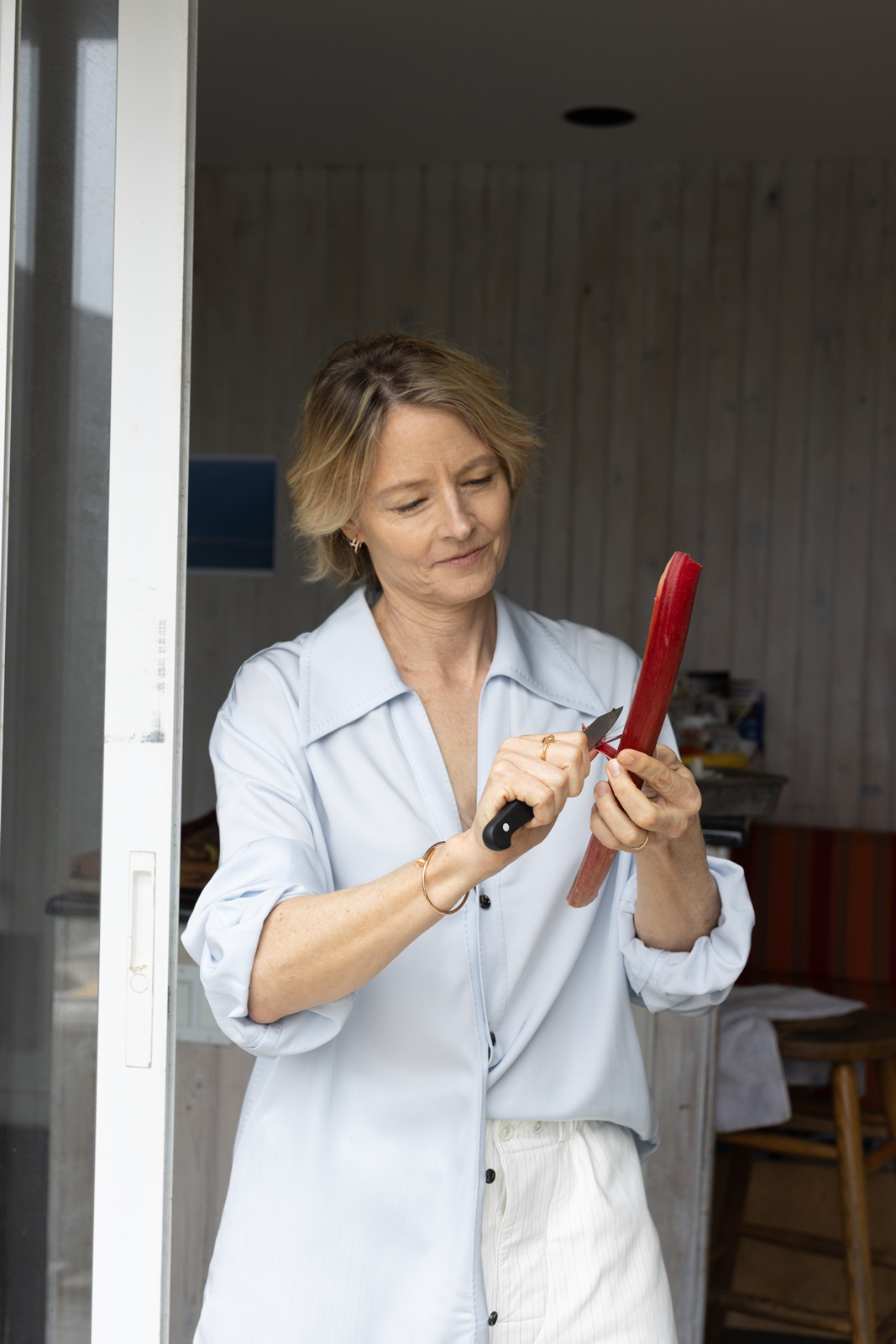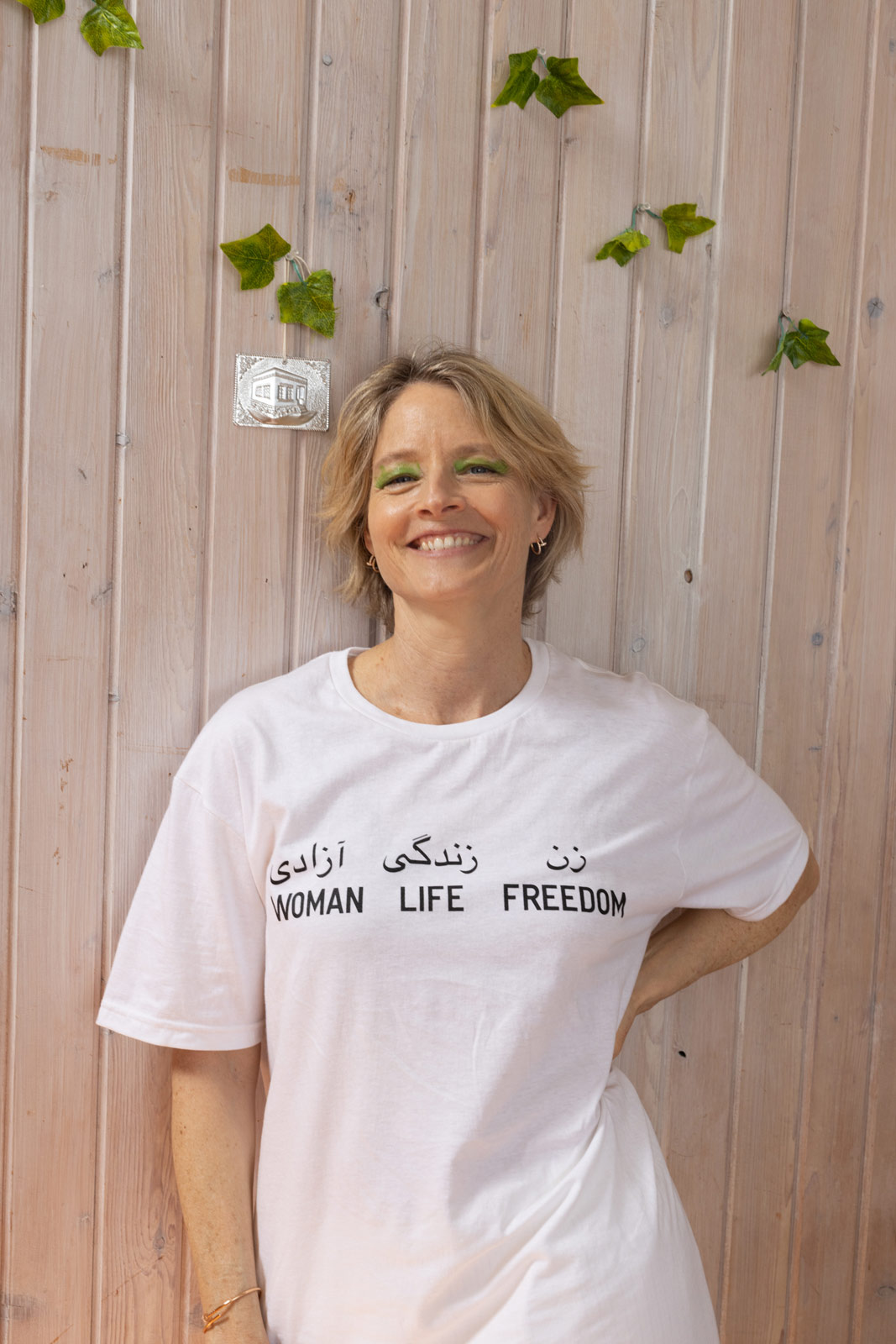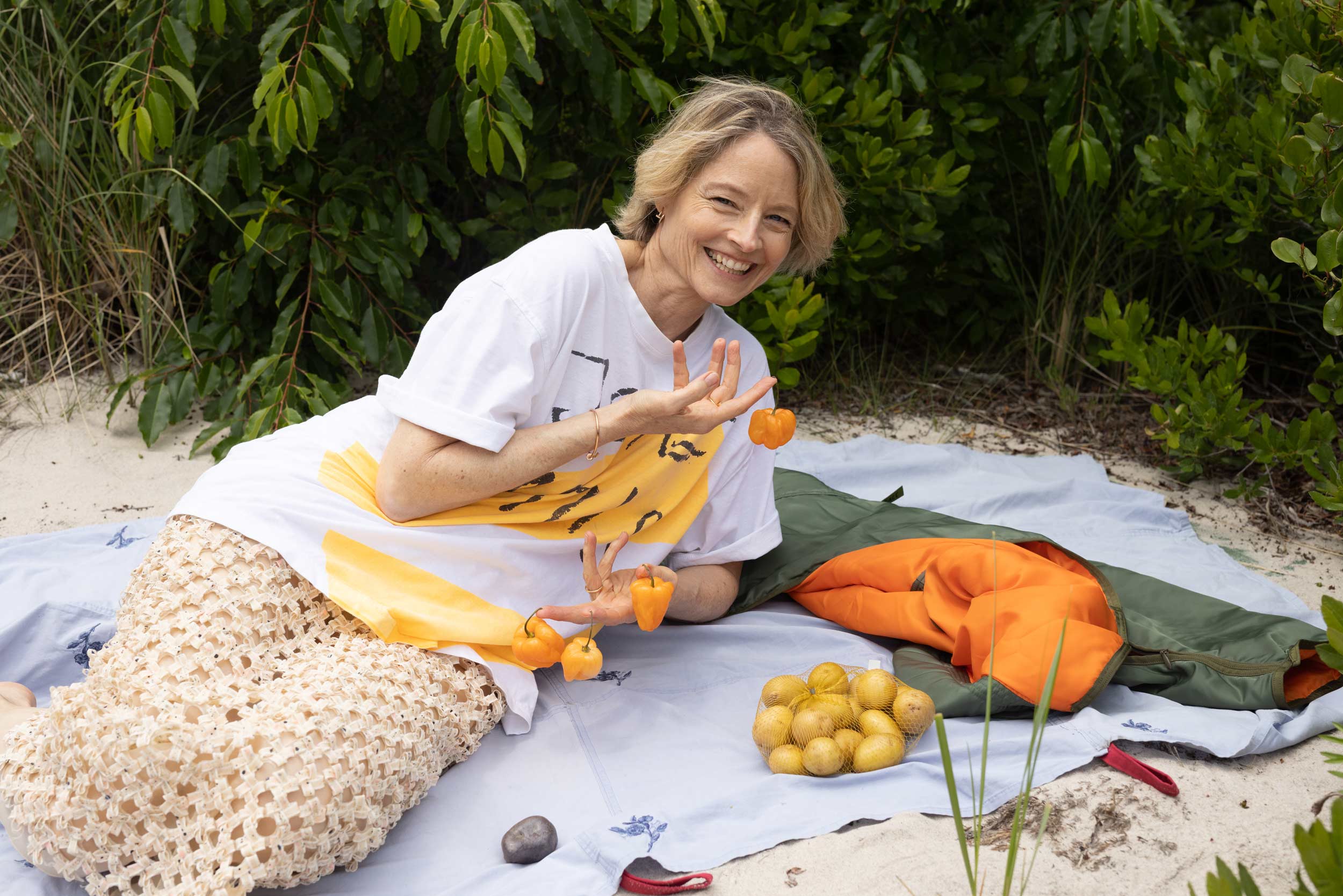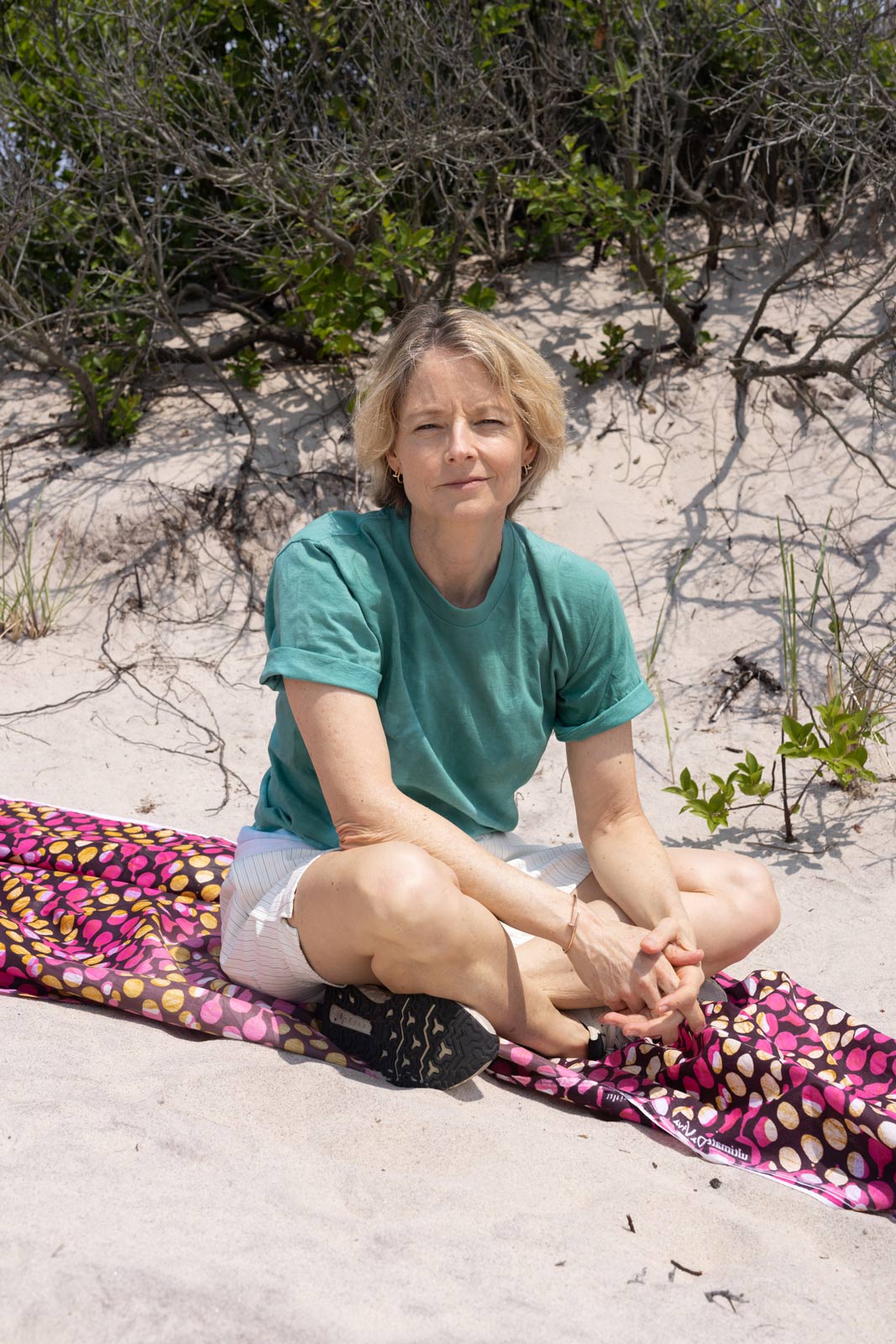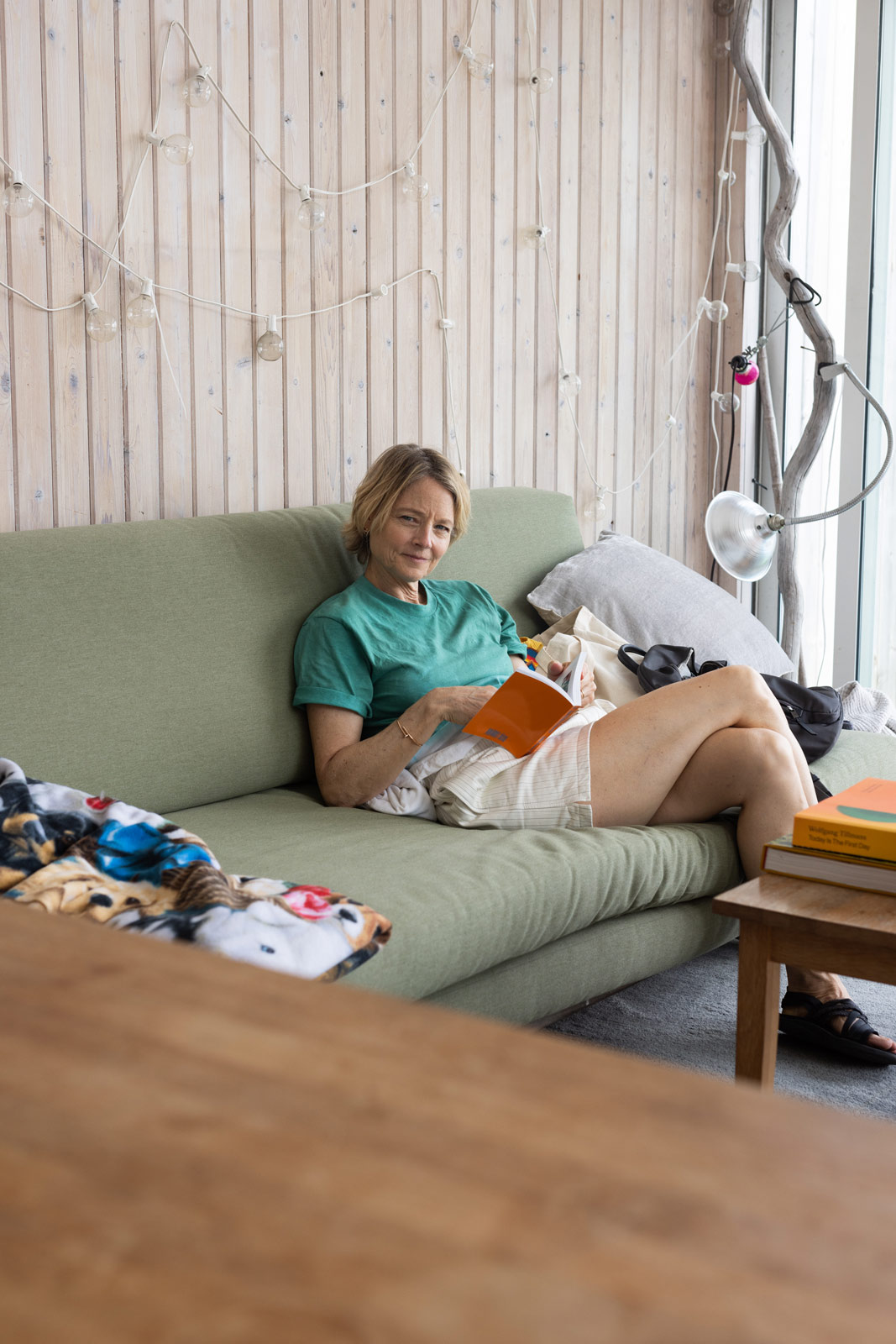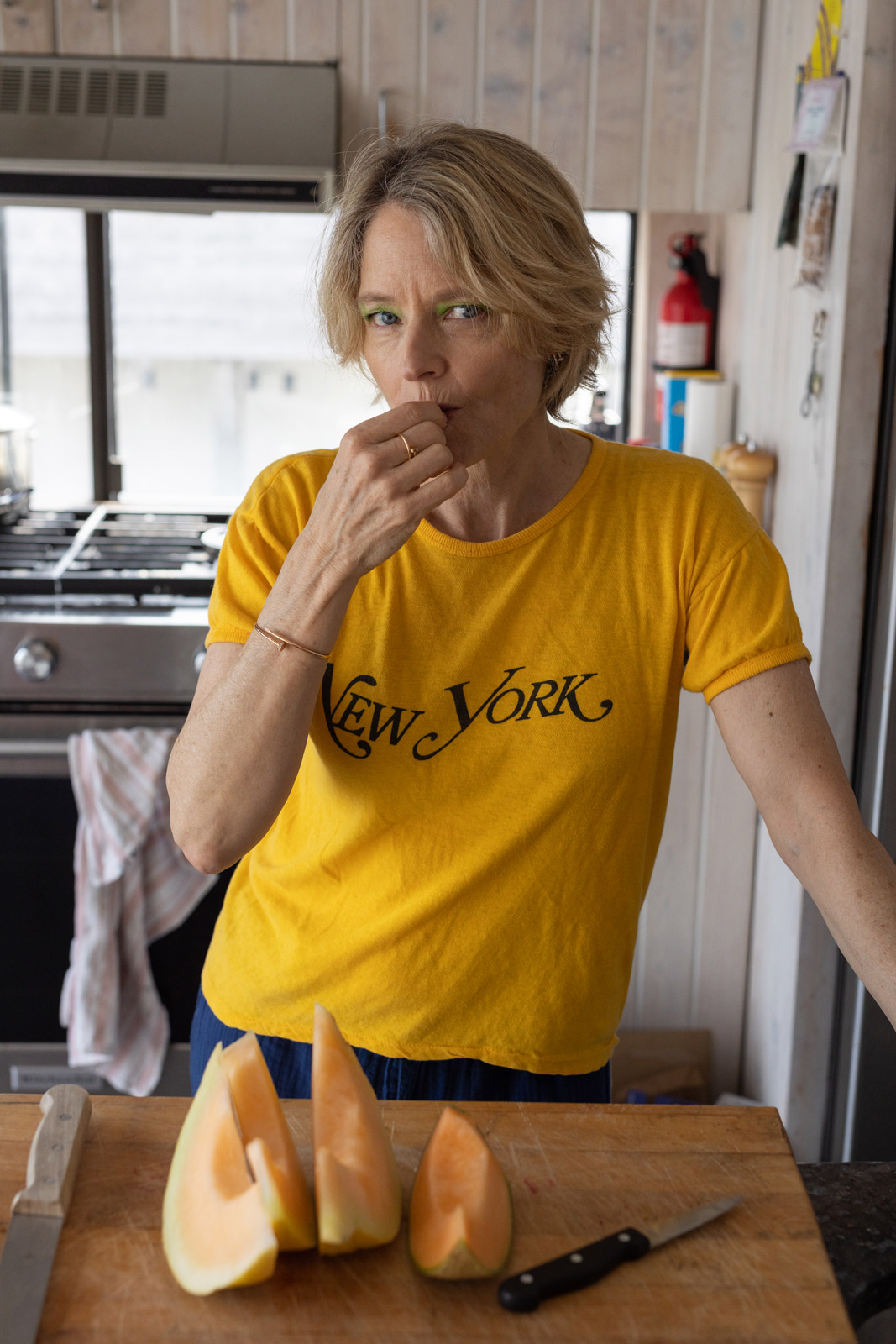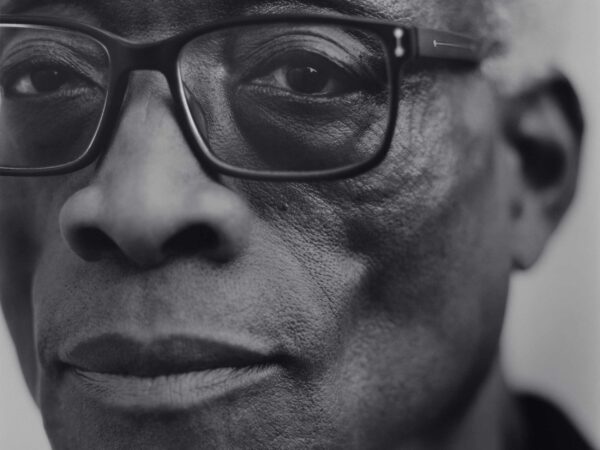
Surveying dialects, dogs, death, and dating, the actor and writer meet for the first time for Document’s Fall/Winter 2023 issue
There’s more than one Jodie Foster. And not in the archetypal actor way that sees a celebrity split into two forms: the fact and the fabrication, the heart and the hoax. She exists outside of those typifications, not offering an easy image to nitpick for glimpses of phony or pretense. There isn’t a private Foster, because there is no public Foster. There is, though, more than one version that we meet in conservatively-distributed doses: the American one and the French one (the latter of whom, she presumes, is nicer); the bourgeois adventurer and the denizen-at-ease, finding home anywhere she goes (mostly via clean comfort foods); the creative giant and the quiet recluse; the maker and the canvas.
Foster’s acting work isn’t an embodiment of an archetype, but an understanding of the lot of them—and the world at large. “I found a way to survive difficult or unusual circumstances by putting my life into boxes that I could handle and control,” she says. “I’m sure every psychoanalyst is shaking their head and saying, ‘What a terrible idea.’ But it kept me alive. It kept me happy. It kept me safe.” Acting aids the process of constructing those boxes. It’s another language through which to unpack ideas. The characters Foster takes on are emotionally challenging and intellectually provocative: a chilling, 12-year-old prostitute in Taxi Driver; a woman struggling to find her footing in the face of newfound independence in Nell; a rape victim in the process of rocky self-reclamation in The Accused; a resilient and calculating combatant in Panic Room; a muscle-minded life and athletic coach in the forthcoming Nyad; and an unaffable lead in the following True Detective; to name just a few. Across it all, she’s chasing freedoms and interrogating the ways they can be both obstructed and realized.
It’s freedom, too, that Foster tries to maintain in her own life—of preserving privacy, evolving purpose, and achieving unmitigated movement. “Growing up in Los Angeles, I always felt like a prisoner of the car,” she says. “In [New York], I could decide where to go. I could be anonymous in a city of millions. For me, that’s complete freedom—walking wherever I wanted to.”
David Sedaris is going for a walk tonight, and he’s going to see a hedgehog. He’s happy to boast about the hedgehog that he will probably see; less so about Foster, who he is seeing now. Foster is a movie star of mythic proportions. To mention an encounter with her would feel bumptious in a way that recalling an encounter with a hedgehog does not. A hedgehog is a simple thing, simultaneously strange and accessible—a duality at the crux of Sedaris’s writing, which indulges in the uncomfortable and usually-unspoken aspects of the everyday.
He writes confessions like, “For the first twenty years of my life, I rocked myself to sleep,” “I love Glee,” and “I haven’t the slightest idea how to change people, but still I keep a long list of prospective candidates just in case I should ever figure it out.” Sedaris’s books are blunt and baring, but not all-telling. “I’ve never felt like I gave my soul away, or said things that have left me vulnerable in a way that I don’t care to be,” he muses. “I just use myself as my material.” His writing is equal parts diaristic and dramatic. Within it, Sedaris is a caricature of himself, painting not-untrue but pointedly fractionated portraits of himself and others.
But with Foster, he did just the opposite—unraveling the divinity of her reputation in describing to a confused Parisian hairdresser the function of the baggie she carried in a tabloid photo. “In trying to communicate why an Academy Award-winning actress might walk down the beach carrying a plastic bag full of dog feces, I got the sort of lump in my throat that other people might get while singing their national anthem,” he writes in Me Talk Pretty One Day. “It was the pride one can feel only when […] called upon to explain what is undoubtedly the greatest thing about your country.” Foster found the story entirely amusing.
Surveying dialects, dogs, death, and dating, the two meet for the first time to swap abrupt, intimate observations.
David Sedaris: I’ve seen you on French TV before.
Jodie Foster: It’s interesting—you acquire a new personality. I have a different voice in French and different memories and a different attitude. I think I’m a much nicer person in French than I am in English.
Did I seem nice?
David: [Laughs]
Jodie: You know, I can’t tell [what you’re thinking], because your video is off. Are you being anonymous on purpose?
David: I don’t know how to turn it on.
Jodie: There’s a cursor on the bottom—press that.
David: There we go. During the pandemic, everybody was doing everything on Zoom. I did two things on Zoom. I’m not smart that way.
Jodie: Our generation has this big fear that, somehow, we’re going to be swallowed up by it. When computers first came out, if you pressed the wrong button, the whole thing was down. So we all became completely paranoid about touching anything. Now, everything is designed so that you can’t mess up that badly.
David: Hugh, my boyfriend, always tells me, ‘You’re not going to break it.’ But I freak out.
Jodie: It’s the only thing that makes me lose my temper.
David: I was about to throw some stuff. Normally, I would never do that. But if I ever do throw anything, it’ll be a telephone.
My publisher wanted me to do those NFTs. I never understood that. I wouldn’t buy bragging rights.
Jodie: I think I’d be too cheap to buy bragging rights.
David: I love to buy things. But I don’t want to buy bragging rights. I can’t even say to people, ‘I spoke to Jodie Foster yesterday,’ because it makes me sound like an asshole.
Do you like to buy things? Like carpets?
Jodie: I like to buy stationery, which is becoming increasingly difficult. Who cares about stationery? I barely look at letters anymore. So why am I buying all this stationery?
David: Do you get a lot of mail?
Jodie: Nobody writes me anymore. It’s sad.
David: I get, like, a thousand letters a year. And I write back to everybody.
Jodie: Everybody?
“I love to buy things. But I don’t want to buy bragging rights. I can’t even say to people, ‘I spoke to Jodie Foster yesterday,’ because it makes me sound like an asshole.”
David: Well, sometimes people write to tell you they hate you and are never going to read your books again. I’m not gonna beg them. And a lot of times, they just write to say, ‘I liked your book.’ Then, I think a postcard will do. But I’m very particular about those. I spent a thousand dollars on postcards when I was in Germany. Germany is the world capital of postcards.
Jodie: Is that right?
David: If you go to the Art Institute of Chicago gift shop, the postcards are printed on receipt paper—they’re so flimsy now. The ones in Germany are good stock. But nobody writes you.
Jodie: I could write you and you could write me back.
David: You did write me one time.
Jodie: I’m sure I did. Because I was in your book.
David: It never occurs to me when I’m writing a book that anyone’s going to read it—especially a person who I’ve seen in movies, or whose books I’ve read.
Jodie: It’s a great story: All these people in a salon, hovering over this trash magazine, see me carrying a little blue bag, like, Why is she carrying that? And you, the resident American, were able to say, ‘That’s the New York Times bag. You carry dog poop in it.’ And they were just appalled. Why would Jodie Foster carry around a bag of poop? That pretty much epitomizes the difference between the French and us.
David: Well, in England, what people do is they fill a bag with dog shit, and then they hang it from a tree branch.
Jodie: Oh, nice.
David: You’re supposed to then take it to the trash, but they never got that part. I can’t tell you how many bags of dog shit I find.
Jodie: Well, you walk a lot.
David: When I’m in England, I walk between 18 and 20 miles a day. It’s 10 o’clock now. But I’ll go out after midnight with a headlamp on. And you know what? I will see a hedgehog.
Jodie: You will?
David: Every night, I’ll see a hedgehog—and it’s not the same one.
Jodie: How do you know it’s not the same one?
David: They’re different sizes.
Jodie: I’ve only seen a hedgehog in a zoo. But there is something thrilling about seeing an animal out in the world. You forget that, somehow, they’re part of your bubble. And then, there they are, staring at you.
David: Farm animals are nice, too. Have you hung out with them at all?
Jodie: I’ve spent time with pigs, cows, sheep, camels, lions, panthers, roosters—pretty much everything.
“It reminded me how often city people, we tend to judge people who live in the country, when it’s just a completely different way of life.”
David: We have some pasture behind our house, and a shepherd was looking for a place to keep his rams. So now we have these rams. And rams are assholes.
Jodie: They are, but they’re your guests.
David: One of the rams died today. They get this problem sometimes in the summer: Flies will lay eggs in their face, and then the maggots will eat them alive. The shepherd was like, ‘This happens.’ No one shed tears.
Jodie: Did he die because maggots ate his face?
David: They said that it could have been stress. I would feel pretty stressed if maggots were eating my face.
Jodie: Especially if you were at somebody’s guest house.
David: He’s going to a place called Hawkins, [where] they put you in a dumpster and burn you.
Jodie: Oh, God. Do you get possession of the horns?
David: They could give you his assets, I guess.
Jodie: I [went to] Alaska, and this guy made a giant archway of horns. Some of them are attached to skulls, too. And he said that people get engaged under the horns. It’s hardcore, but quite beautiful.
David: So many of the cities in Alaska are so ugly. I don’t mean to sound like a snob, but I wish the French had settled Alaska. The French would put up buildings that match the landscape. The Americans were like, ‘Let’s put up this ugly aluminum shed.’
Jodie: In those areas, it’s very difficult to get anything in. And they would rather spend money on the things they need than [on] painting their house—which gives it interesting character, because everything looks weathered.
David: Somebody told us that, when he grew up, he used to trap mountain lions. My friend said, ‘I don’t like that one bit.’ And he explained, ‘We had to sell the skins for money for school.’ It reminded me how often city people, we tend to judge people who live in the country, when it’s just a completely different way of life.
Jodie: They’re really putting a lot of effort into—especially [among] native populations—understanding subsistence living, because they just can’t afford $30 Oreos, which is what it’s like at the market. The young people have to come to understand how to live off the land again.
David: Have you been to Finland? In Finland, they can’t keep their clothes on for five minutes. There are saunas everywhere.
Jodie: In Iceland, there are all those pools—it’s like going to the pub, but they’re more prudish. They keep their clothes on.
I went on this hike and I had my little pants and my special jacket, and I was like, Wow, this is really challenging. And next thing I know, an 80-year-old grandma in flip-flops is hiking up next to me. It’s their backyard—these extraordinary expanses of nature. And they don’t put signs [out] like they do in the States: Like, Danger, you could get a third-degree burn, or Watch out, you could fall off this cliff, or If you don’t have a sweater here, you’ll die.
David: You can always tell when you’re in a country that doesn’t have a lot of lawsuits.
Jodie: It makes you feel like you get to be a bourgeois adventurer somehow. I grew up with a single mom, and she didn’t particularly like getting her hands dirty. Even if she was eating watermelon, or reading the New York Times, she’d wear little gloves. We never did anything that was sloppy.
David: Did your mom die?
Jodie: About five years ago.
David: Were you sad when she died?
Jodie: I was, but she had dementia for 15 years. So by the end, she hadn’t talked in a long time. I got to say goodbye to her little by little, and I didn’t depend on her for anything anymore. It was a sweeter goodbye than I expected.
David: My dad died a couple of years ago. I didn’t have that with him, either—but he didn’t have dementia.
Jodie: How old was he?
David: Ninety-eight, and he really overstayed his welcome. So I didn’t really feel anything. But when my mother died, it was devastating. I thought, God, it would suck to go through that twice.
“It’s like we’re thrown into these families: We grow all our barnacles and tentacles separately, and then we come together and we’re supposed to get along, to understand one another, to spend the rest of our lives with each other.”
Jodie: Did your brothers and sisters feel the same way?
David: We were at a restaurant together when we got the news that he died. And by the time the bill came, we were talking about other things. I mean, it wasn’t even an all-night conversation.
Jodie: It’s like we’re thrown into these families: We grow all our barnacles and tentacles separately, and then we come together and we’re supposed to get along, to understand one another, to spend the rest of our lives with each other.
David: I have a sister who committed suicide, and she was all we talked about. Everything revolved around her because she created great drama. And then when she died, there was a void. Who do we talk about now? And then my dad died, and everything just went to pieces.
Jodie: Between you and your family? Because you didn’t have him to talk about?
David: No, it was more [that] people became their childhood selves again.
Jodie: What was your childhood self?
David: Well, okay, maybe I don’t mean me.
Jodie: [Laughs] So everybody but you?
My theory is that there are these awful, huge moments: Your parents pass away, your children leave, the big divorce. And those life-shattering moments are also freedoms. Because you don’t have to care for your children anymore; I have to love and support them, but I can’t live their life for them. You get divorced, it’s the same. What am I going to do? With parents, you don’t realize how much time you spend worrying about them. When they pass—especially peacefully—you’re like, I can fail now.
David: My experience was just so different. When my brother Paul lost a lot of weight, my father had to lose more weight. The first time I had a book on the bestseller list, my mother had [already] died, and I called my dad. He said, ‘Have a nice life,’ and hung up the phone. When you’re with somebody who actively wants you to fail, the last thing you want to do is live up to his expectations.
Jodie: Maybe for this next generation, this will be somehow moot. But for our generation, there’s that competitiveness between fathers and their sons, and so much of men’s motivation is around the idea of failure—they’re all trying desperately to make sure the word failure doesn’t appear on their gravestone.
David: Are you a direct person?
Jodie: I think I am, but I’m not a spontaneous responder. I have to marinate first. I love [the] English, because when they don’t like something, they say things like, ‘I’m a little confused.’ And Americans are like, ‘Here’s what I want you to do, because I said so.’
David: Germany is very much that way. I thought for a while I wanted to move there. But I think that [directness] would be the hardest thing to get used to.
Jodie: The trains definitely run right. And I like that.
David: I like the way the language is put together—the math of it. I don’t like math, but I like the way that their sentences are structured.
Jodie: Do you think travel is your number-one inspiration?
David: Somebody asked me a while ago, ‘Where’s your home?’ And I said, ‘I don’t know that I have one.’ Do you feel it when you’re in New York or Los Angeles? Do you think, Ah, I’m home?
Jodie: I’m like a baby. Food and sleep are my home. My favorite place is an Oakwood Hotel that has that terrible rental furniture, because then I can think. But I do need those foods—even just cherry tomatoes and flour tortillas and spinach. So it’s hard for me to be gone for more than five or six months from LA or New York.
David: Do you ever go to Japan?
Jodie: I’ve been many, many times. I went to see you at UCLA, and a lot of it was about your trip to Japan.
David: I didn’t know you’d ever come to see me.
Jodie: I’ve seen you quite a few times.
David: Really? I’d have a hard time if someone said you were in the audience. I would think about it every second I was up there. If you go to something like that, wouldn’t you think, Oh, he’s reading it wrong?
Jodie: No, no, no. I love being in the moment with words. Words were my first love. I don’t think I was meant to be an actor. It was just a dumb luck thing I fell into. When I was a kid, I always had a book in my back pocket. Even now, I do crossword puzzles, fantasy football—things that are bubble-focused. So language is everything. And I love hearing things read.
Even with acting, I didn’t go to Juilliard. I didn’t do any of that stuff. For me, the way in is always language. It’s never, like, Imagine your grandpa is dead. That doesn’t work for me. I need the language to be touching. The word itself has some kind of connective tissue.
“I love being in the moment with words. Words were my first love. I don’t think I was meant to be an actor.”
David: Have you ever done an audiobook?
Jodie: Oh, yeah. And I loved doing cartoons. I started young because I could read well, and I could play boys, too.
David: When I first moved to New York, I got a job at Santaland, and they asked me to write a play. But it never occurred to me to say that the person playing me would need to be gay. It never occurred to me that you’d have to be gay to understand what it was like to be an elf at Macy’s, or to be me. And I hate the thought that a theater would impose that. In the original production they did in New York, the guy wasn’t gay. And it never occurred to me that he should be. He’s just too tall, in my opinion.
Are you tall?
Jodie: No, I’m 5’3”. I’ve never felt short. But I’m reminded by others that I am.
David: I’m 5’5”.
Jodie: I never felt like I needed to be bigger, or taller. And I’m sure it probably plays into parts of my personality. I don’t know—maybe tallness would be an important attribute to get right.
David: I never wanted to be tall. But sometimes guys treat me like they have something I want. And I want to say, ‘I don’t want it!’
That’s what seems cruel to me about those dating sites. It’s not like if you met somebody, you would think, He weighs more than I wanted, or His hair’s not thick. You would fall in love with the person anyway. But if you’re doing it all on your phone, then you’re going by looks, so people aren’t getting the chances that they would have gotten in the past.
Jodie: There is no kind of spontaneous meeting anymore. The only kind of spontaneous meeting is on the internet. Which seems so unspontaneous.
Well, next time I see you read, maybe I’ll come backstage.
David: Please do.
Hair Evanie Frausto at Streeters. Make-up Emi Kaneko at Bryant Artists. Stylist Assistants James Kelley, Emelia Watson. Make-up Assistant Amelia Berger. Production Harbinger Creative. Talent Director Tom Macklin.


